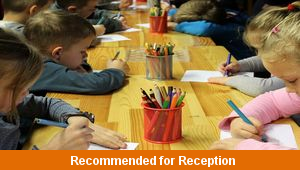Cube Shapes

This numeracy teaching pack for the Foundation Stage gets the children to select, count and record the numbers of cube shapes that have been used to make a range of different design models.
The class can design and make their own models using selected numbers of cubes to ten for a partner to practise counting the numbers of cubes in each shape.
Download this teaching pack including display posters, classroom activities and an interactive presentation to select, count and record the numbers of cube shapes that have been used to make a range of different design models
Activities in this teaching pack include display posters to identify different objects shaped as cubes that can be found around the school, a set of cards to count numbers of cubes that have been used to make a range of different shapes and a worksheet to select numbers to ten to use when modelling designs made from cube shapes.
The interactive presentation gets the children to explore how to count the numbers of cubes that have been used to make a range of different shapes.
This lesson is part of a numeracy scheme of work to get the children to identify and record different types of 3D shapes that can be seen in a range objects by sorting and modelling examples of each shape. There are teaching activities for shared learning, differentiated worksheets to support independent learning and interactive presentations to introduce concepts and key skills.
-

Halving Things
Explain and model how to find and record the halves of some of the different objects that can be used at home and in school
-

School Friends
Identify and learn classroom routines and organisation by exploring and describing information and likes and dislikes for each of their classmates
-

Classroom
Identify the location and function of different objects used in the classroom and explore how to formulate rules to manage the classroom safely
-

Shape Patterns
Identify, describe and compare the sequences of geometric shapes that have been used to create a range of different patterns
